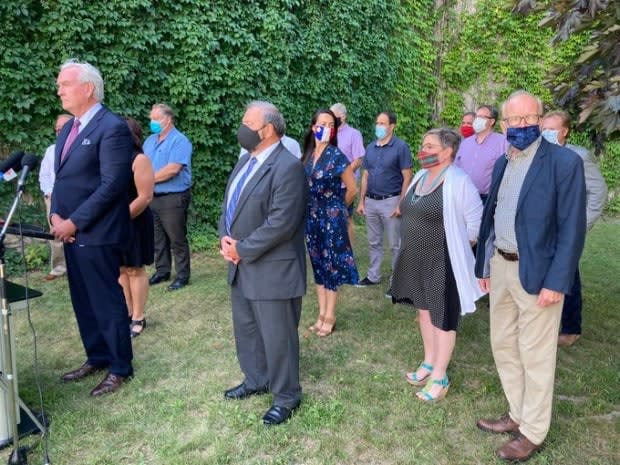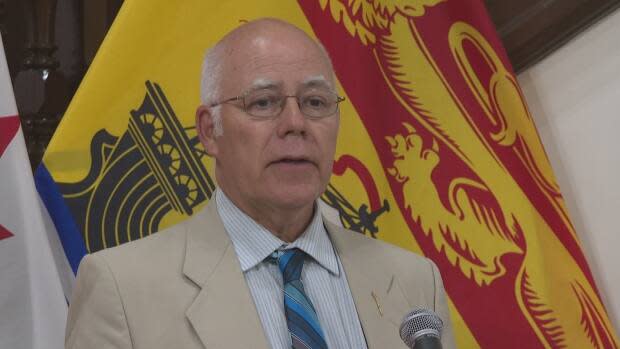Liberals reject Higgs proposal to delay early election
New Brunswick appeared to be headed for a snap election Friday after the opposition Liberals pulled out of negotiations to delay a vote until October 2022.
But Premier Blaine Higgs said he would not trigger a campaign before Monday at the earliest.
"I don't plan to call an election over the next 48 hours," he told reporters.
"I am going to be thinking about this now over the weekend, about what the next steps should be. But this has made the path forward -- one could say clearer, one could say more difficult."

Earlier in the afternoon, Liberal Leader Kevin Vickers said he was walking away from four-party negotiations to avert an election because Higgs wanted unlimited powers for two years while insisting that other parties sign on for major reforms.
He said if New Brunswickers are sent to the polls now, it will be the premier's fault.
"It is totally irresponsible to consider having an election during an international pandemic. It makes no sense. This is not a time for elections. This is a time to be focused on New Brunswick."
Higgs said he accepted that an election would be his decision and he would have to justify it to voters.
"I do, yes. I will, yes."
The premier sent a letter to the three opposition parties Monday asking them to agree to avoid forcing an early election until the scheduled date in October 2022 or until the COVID-19 pandemic is over.
Higgs has been hinting for weeks that he would trigger a campaign, justifying the threat by saying the province needs stability to manage the pandemic and continue restarting the economy.
The agreement would include a promise by the other parties to not defeat the Progressive Conservative minority government on confidence and supply votes such as the budget and trigger a campaign.
In return, Higgs, whose approval ratings in polls have been at record highs, would also not call an election until 2022.
The premier said he wanted a deal by Friday because the coming weeks are the best "window" for an election if one has to happen, because the province is in a relative lull with COVID-19 ahead of a possible second wave.
Mathematically, Higgs doesn't need the Liberals to be part of a deal for him to stay in power for two more years. The votes of the Greens and the Alliance would be enough.
But he repeated Friday that would not be enough because "you're going to have one party spending its whole waking time trying to defeat all of us."
He acknowledged the Liberals "don't have the votes today" to do that but could get there eventually, an apparent reference to three by-elections expected this fall and the possibility of others in the future.

Green Leader David Coon and People's Alliance Leader Kris Austin both said they were open to finding a way to work with Higgs without the Liberals.
"I'm willing to work with any party that's willing to work with me," Austin said.
The Alliance leader was already practising his campaign lines Friday, condemning what he called the two "mainstream" political parties -- even though he's been cooperating in the legislature with one of them, the PCs, since 2018.
"The Liberals did not have to walk out of that meeting … and the premier does not have to call an election," he said.
Coon said he regretted the turn of events because, while he went into the talks sceptical, "to my surprise I found that the premier was quite sincere about trying to do something quite unprecedented" with a four-party deal.

Vickers told reporters he walked away from the talks, which began Wednesday, because Higgs wasn't answering basic questions about how a four-party deal would work.
He said the premier wanted a de facto majority with other parties signing on for major initiatives like municipal government reforms and controversial changes to binding arbitration for police officers and firefighters.
He said he was being forced to negotiate "with a gun to the head."
But Higgs said the gun at Vickers's head was his own caucus, pointing to signs earlier Friday of resistance to any deal with the premier.
"I think Mr. Vickers was in a difficult spot," he said.
Bathurst East-Nepisiguit-St. Isidore MLA Denis Landry, who is the leader of the Official Opposition in the legislature because Vickers doesn't have a seat, told reporters Friday morning he was in favour of a campaign, contradicting the party's official line.
"Our caucus is not representing the whole province, but in an election everybody will have a say: yes or no," he said.
And Caraquet MLA Isabelle Thériault wouldn't say whether she was willing to put her signature on an agreement involving Higgs and Austin, who is critical of official bilingualism. Instead she merely waved an Acadian flag.
Vickers acknowledged Thursday there were "reservations and concerns" within his caucus and said he would take "direction" from them on whether to continue the talks. He announced his pullout after a meeting with them at a Fredericton hotel.


